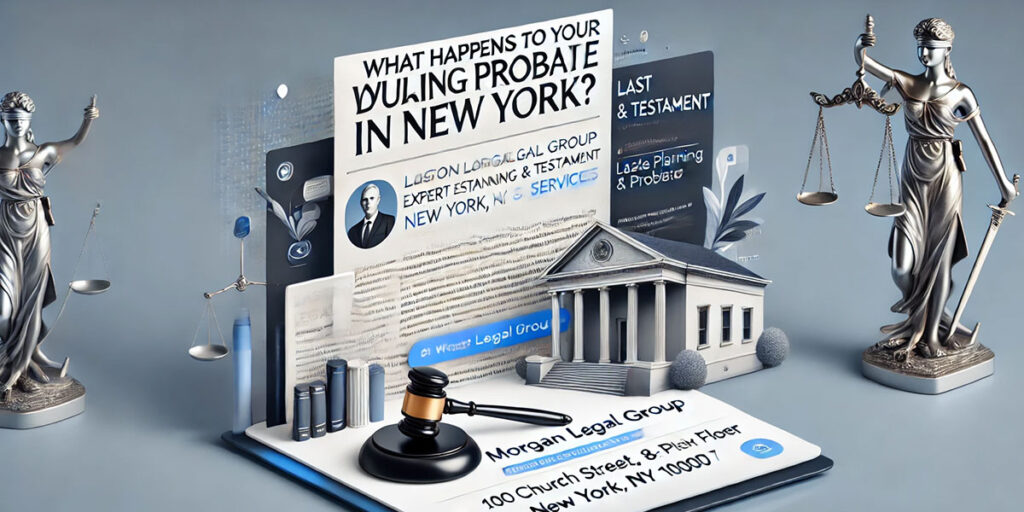Unlocking the Mystery: What Happens to Your Will During Probate in New York?
For many New Yorkers, the creation of a will represents a crucial step in responsible estate planning. Indeed, a will acts as a cornerstone of your legacy, detailing your wishes for asset distribution after your passing. However, simply having a will is not the final step. To ensure your will is legally recognized and your wishes are carried out, it must typically go through a legal process known as probate, especially in New York State. Morgan Legal Group, a trusted estate planning law firm in New York City, frequently guides executors and administrators through the often-complex probate process. Therefore, we understand that a common question arises: “What exactly happens to my will once probate begins?” This detailed blog post will demystify the journey of your will through the New York probate system. We will explain what occurs from filing your will with the Surrogate’s Court to its ultimate role in guiding estate administration. Furthermore, we will clarify the steps involved, address potential challenges, and highlight why understanding this process is essential for anyone involved in estate planning or estate administration in NYC.
The Will’s Journey Begins: Filing and Initial Steps in NY Probate
The journey of your will through probate commences with a crucial first step: filing the original will with the Surrogate’s Court in the New York county where you resided. To begin with, this filing officially initiates the probate process and sets in motion a series of legal procedures designed to validate the will and administer your estate according to its terms. Moreover, understanding what happens to your will at this initial stage is essential for comprehending the subsequent steps of probate administration in New York.
From Drawer to Docket: Submitting the Will to the Surrogate’s Court
The process starts with locating the original will and formally submitting it to the court.
Locating the Original Will: The Importance of Safekeeping
The first practical step is to locate the original Last Will and Testament. Indeed, the probate process requires the *original* will, not a copy. Therefore, it is crucial to store your original will in a safe and accessible location known to your executor or a trusted family member. Common secure locations for will safekeeping include:
- Safe Deposit Box: A safe deposit box at a bank provides a secure storage location. However, accessing a safe deposit box after death can sometimes require a court order, so ensure your executor has proper access instructions or consider co-ownership of the box.
- Fireproof Home Safe: A fireproof and waterproof safe in your home offers convenient access. Make sure your executor or a trusted individual knows the safe’s location and combination or key.
- Attorney’s Office: Many estate planning attorneys, like Morgan Legal Group, offer will storage services for their clients, providing secure and easily retrievable will safekeeping.
Clearly communicating the location of your original will to your executor or trusted individuals is essential to ensure a smooth start to the probate process. A misplaced or lost will can significantly complicate and delay estate administration.
Filing the Petition for Probate: Officially Starting the Process
Once the original will is located, the next step is for the designated executor (or, if there is no will or the executor is unable to serve, a qualified individual, typically a close relative) to file a formal Petition for Probate with the Surrogate’s Court in the county where the deceased person resided. This petition is a legal document that officially requests the court to:
- Admit the Will to Probate: Formally recognize the will as a valid legal document.
- Appoint the Executor: Officially appoint the individual named in the will as executor, granting them legal authority to administer the estate.
The Petition for Probate must be accompanied by several key documents, including:
- Original Last Will and Testament: The original, signed will document.
- Certified Copy of the Death Certificate: Official proof of the deceased person’s passing.
- Filing Fee: Payment of the required Surrogate’s Court filing fee, which varies based on the size of the estate.
- Supporting Affidavits and Documentation: Additional documents may be required depending on the specific circumstances of the estate and the Surrogate’s Court requirements.
Filing the Petition for Probate with the Surrogate’s Court officially commences the probate proceeding and marks the beginning of the will’s journey through the New York legal system.
Will Lodged with the Court: Becoming a Public Record
Upon filing with the Surrogate’s Court, the original will is officially “lodged” with the court. This means the court takes possession of the original document and it becomes part of the official court record for the probate proceeding. Importantly, once the will is lodged with the court, it becomes a public record, accessible to anyone who wishes to view it. This public accessibility of wills in probate is a key distinction compared to Living Trusts, which remain private documents. The will, now a public document, will be assigned a unique case number and will be maintained by the Surrogate’s Court Clerk as part of the estate’s probate file. All subsequent court filings and documents related to the probate proceeding will be added to this public file, creating a comprehensive record of the estate administration process.
This initial filing of the will and Petition for Probate is the first critical step in the probate process. It marks the transition of the will from a private document to a public record under the jurisdiction of the New York Surrogate’s Court, setting the stage for the subsequent steps of will validation and estate administration.
Will Validation: Ensuring Legal Authenticity in NY Probate
Once the will is filed with the Surrogate’s Court, a crucial phase of the probate process begins: will validation. Indeed, the Surrogate’s Court must legally determine that the submitted document is, in fact, the deceased person’s valid Last Will and Testament before probate administration can proceed based on its instructions. Furthermore, this validation process is essential to ensure the will is authentic, legally sound, and accurately reflects the deceased person’s testamentary wishes under New York State law.
Scrutinizing the Will: The Surrogate’s Court’s Validation Process
The Surrogate’s Court undertakes a careful review to validate the will’s legal authenticity.
Review of Will Formalities: Meeting Legal Requirements
The Surrogate’s Court meticulously reviews the will document to ensure it meets all the formal legal requirements for a valid will under New York Estates, Powers and Trusts Law (EPTL). Key legal formalities that the court examines include:
- Will is in Writing: New York law requires wills to be in writing. Oral wills or video wills are not valid in New York, with very limited exceptions for military personnel in specific circumstances.
- Signed by the Testator (Will-Maker): The will must be signed by the testator (the person making the will), also known as the will-maker or deceased person. The signature must be the testator’s own and must be made with testamentary intent, clearly indicating their intention to sign their Last Will and Testament.
- Properly Witnessed: New York law requires wills to be properly witnessed to ensure authenticity and prevent fraud. The will must be signed in the presence of at least two credible witnesses, who must also sign the will in the testator’s presence and in each other’s presence, attesting to the testator’s signature and apparent testamentary capacity. New York law specifies requirements for witness qualifications and the witnessing procedure, and the court carefully reviews witness affidavits or testimony to ensure these requirements are met.
- Testamentary Capacity: The testator must have possessed testamentary capacity at the time they signed the will. This means they must have been of sound mind, understood they were signing a will, understood the nature and extent of their property, and understood who their natural beneficiaries were. The court may scrutinize the testator’s capacity, particularly if there are any red flags or potential challenges raised regarding their mental state at the time of will execution.
- Absence of Undue Influence or Fraud: The will must be the product of the testator’s own free will and not the result of undue influence or fraud. Undue influence occurs when someone improperly coerces or pressures the testator into making a will that does not reflect their true wishes. Fraud occurs when someone deceives the testator into signing a will based on false information or misrepresentations. The court may investigate potential claims of undue influence or fraud, particularly if raised by potential heirs or beneficiaries.
The Surrogate’s Court’s review of these legal formalities is crucial to ensure the will is a valid and legally enforceable document under New York law. Wills that fail to meet these formal requirements may be deemed invalid and denied probate.
Witness Affidavits or Testimony: Verifying Will Execution
To further verify the will’s authenticity and proper execution, the Surrogate’s Court typically requires sworn affidavits from the witnesses who signed the will. These witness affidavits, often called “attesting witness affidavits” or “proof of will affidavits,” are sworn statements from the witnesses attesting to the circumstances of the will signing and verifying key facts, such as:
- Witnesses were present when the testator signed the will.
- Testator appeared to be of sound mind and understood they were signing their will.
- Testator signed the will voluntarily and without duress.
- Witnesses signed the will in the testator’s presence and in each other’s presence.
These witness affidavits provide sworn testimony under oath, supporting the will’s validity and proper execution. In some cases, if a witness cannot be located or is deceased, the court may require alternative forms of proof, such as testimony from individuals who were familiar with the testator’s signature or handwriting. The Surrogate’s Court’s goal is to gather sufficient evidence to be reasonably certain that the will was validly executed and reflects the testator’s true testamentary intentions.
Due Diligence to Locate Heirs: Notifying Interested Parties
As part of the will validation process, the Surrogate’s Court also requires the executor to undertake due diligence efforts to locate and notify all of the deceased person’s potential heirs and beneficiaries, even those who are not named in the will. This “due diligence” process is essential to ensure that all interested parties are given proper legal notice of the probate proceeding and an opportunity to raise any objections or concerns regarding the will’s validity or the estate administration. Reasonable efforts to locate heirs may include:
- Searching Public Records: Reviewing public records, such as census data, property records, and online databases, to identify potential relatives.
- Contacting Family Members: Contacting known family members and inquiring about other potential relatives or heirs.
- Hiring a Professional Genealogist or Heir Search Firm: In complex cases where heirs are difficult to locate or family relationships are unclear, the executor may need to hire a professional genealogist or heir search firm to conduct a more extensive search.
- Publication of Notice: In some cases, if heirs cannot be located through reasonable efforts, the court may require publication of legal notice in newspapers or online publications to notify any unknown heirs of the probate proceeding.
Providing proper legal notice to all potential heirs is a fundamental aspect of due process in probate proceedings. Failure to properly notify all interested parties can lead to legal challenges and potential delays in finalizing the estate administration.
This rigorous will validation process undertaken by the Surrogate’s Court is a critical safeguard in the New York probate system. It ensures that only legally valid wills are admitted to probate and that the deceased person’s testamentary wishes are honored and implemented in accordance with New York law. Wills that successfully pass this validation process are then formally “admitted to probate” by the court, paving the way for the next phase of estate administration based on the will’s instructions.
Will Becomes the Blueprint: Guiding Estate Administration
Once the Surrogate’s Court formally admits the will to probate, it transitions from a document under scrutiny to the central blueprint guiding the entire estate administration process. Indeed, the validated will now serves as the legal roadmap for the executor, outlining their powers, responsibilities, and, most importantly, the deceased person’s explicit instructions for how their assets should be managed and distributed. Therefore, the will’s provisions become the governing principles for the executor’s actions and decisions throughout the remainder of the probate proceedings.
Executor’s Roadmap: The Will Directs Asset Management and Distribution
The validated will dictates how the executor must proceed with managing and distributing the estate assets.
Executor’s Powers and Responsibilities Outlined in the Will
The will itself often contains specific provisions that delineate the executor’s powers and responsibilities in administering the estate. While New York law grants executors certain statutory powers, the will can further clarify or expand upon these powers, providing specific guidance tailored to the deceased person’s wishes and the nature of their estate. Common executor powers and responsibilities that may be outlined or referenced in the will include:
- Authority to Collect and Manage Assets: The will typically confirms the executor’s authority to take control of and manage all of the deceased person’s probate assets. This includes opening estate bank accounts, managing investment accounts, maintaining real property, and taking steps to preserve and protect estate assets during the probate period.
- Power to Pay Debts and Expenses: The will implicitly or explicitly grants the executor the power and responsibility to pay all legitimate debts of the deceased person, as well as estate administration expenses, such as funeral costs, legal fees, and accounting fees, utilizing estate assets for these purposes.
- Tax Authority: The will acknowledges the executor’s responsibility to handle all estate tax matters, including preparing and filing estate tax returns (both federal and New York State, if applicable) and paying any estate taxes owed from estate assets.
- Discretionary Powers: In some cases, the will may grant the executor certain discretionary powers, allowing them to make decisions or take actions that are not explicitly detailed in the will, but are deemed necessary or appropriate for the efficient administration of the estate, within legal and ethical boundaries.
The will’s provisions, in conjunction with New York State law, define the scope of the executor’s authority and guide their actions in managing the estate assets responsibly and in accordance with the deceased person’s wishes.
Beneficiary Designations and Inheritance Instructions
The most crucial aspect of the will, for many individuals, is its explicit designation of beneficiaries and instructions for how estate assets should be distributed to those beneficiaries. Indeed, the will serves as the legal instrument for directing inheritance and ensuring your chosen loved ones receive your assets according to your wishes. Key aspects of beneficiary designations and inheritance instructions within the will include:
- Naming Primary Beneficiaries: The will clearly names the primary beneficiaries who are designated to inherit the estate assets. Beneficiaries can be individuals (such as family members, friends, or loved ones), charities, or other entities. The will should clearly identify beneficiaries by name and relationship to the deceased person to avoid ambiguity.
- Specific Bequests vs. Residuary Estate: The will may include specific bequests, which are gifts of particular assets to named beneficiaries (e.g., “I bequeath my antique watch to my son, John”). The will also typically includes a residuary clause, which directs how the remaining estate assets (the “residuary estate”) should be distributed after all specific bequests, debts, taxes, and expenses have been paid. The residuary clause is often the most important part of the will, as it governs the distribution of the bulk of the estate assets.
- Contingent Beneficiaries: Prudent wills also name contingent beneficiaries, who will inherit assets if a primary beneficiary predeceases the deceased person. Contingent beneficiary designations prevent assets from passing according to intestacy laws if a primary beneficiary is no longer living.
- Guardianship Nominations (if applicable): If the deceased person has minor children, the will typically includes provisions nominating guardians to care for those children in the event of the testator’s death. Guardianship nominations are a crucial function of a will for parents of minor children, ensuring their children are cared for by individuals they trust.
The will’s beneficiary designations and inheritance instructions are legally binding and must be strictly followed by the executor in distributing estate assets. The Surrogate’s Court oversees this distribution process to ensure compliance with the will’s terms.
Addressing Potential Contingencies and Complex Scenarios
Well-drafted wills often anticipate potential contingencies and complex scenarios that may arise during estate administration and include provisions to address these situations, providing further guidance to the executor and ensuring the estate plan remains robust and adaptable. Examples of contingency provisions and complex scenarios addressed in wills include:
- Simultaneous Death Clause: A simultaneous death clause addresses the scenario where the deceased person and a beneficiary die simultaneously or in close proximity to each other. This clause clarifies how assets should be distributed in such situations, preventing unintended consequences or probate complications.
- Spendthrift Clause: A spendthrift clause, if included, protects a beneficiary’s inheritance from their creditors or potential mismanagement. It restricts the beneficiary’s ability to assign or pledge their inheritance before it is actually distributed to them, safeguarding the assets from creditors or financial imprudence.
- Trust Provisions within a Will (Testamentary Trusts): In some cases, the will may create testamentary trusts, which are trusts established *within* the will itself, becoming effective upon probate. Testamentary trusts can be used to manage assets for minor children, beneficiaries with special needs, or for other long-term asset management purposes, providing more sophisticated distribution options than outright bequests.
- No-Contest Clause (In Terrorem Clause): Some wills include a no-contest clause, also known as an “in terrorem” clause, which discourages beneficiaries from challenging the will. This clause typically states that if a beneficiary challenges the will and loses, they will forfeit any inheritance they would have otherwise received under the will. No-contest clauses are intended to deter frivolous will contests and promote efficient estate administration, but their enforceability can be complex and subject to certain limitations under New York law.
By outlining executor powers, beneficiary designations, and addressing potential contingencies, the will provides a comprehensive blueprint for estate administration. The executor is legally obligated to follow this blueprint, ensuring the deceased person’s wishes, as expressed in their validated will, are meticulously carried out throughout the probate process.
Potential Challenges to the Will During Probate: Will Contests and Validity Disputes
While the Surrogate’s Court strives to validate and uphold wills, the probate process is not always straightforward or uncontested. Indeed, wills can be subject to legal challenges, known as will contests, where interested parties formally object to the will’s validity and seek to have it deemed invalid by the court. These will contests can introduce significant complexities, delays, and expenses into the probate process, underscoring the importance of understanding potential challenges to a will during probate in New York.
Grounds for Challenging a Will’s Validity in NY Probate Court
Under New York law, there are specific legal grounds upon which a will can be formally challenged in Surrogate’s Court.
Lack of Testamentary Capacity: Questioning the Testator’s Sound Mind
One of the most common grounds for will contests is a claim of lack of testamentary capacity. To execute a valid will in New York, the testator (will-maker) must have possessed testamentary capacity at the time they signed the document. This means the testator must have been of “sound mind,” understanding:
- They were signing a will and the nature of that act.
- The nature and extent of their property (general understanding of their assets).
- Who their natural beneficiaries were (typically family members).
If it is alleged that the testator lacked testamentary capacity at the time of will signing, a will contest may be initiated. Evidence presented in will contests regarding capacity often includes medical records, physician testimony, witness testimony regarding the testator’s mental state, and other relevant documentation. Common scenarios where testamentary capacity is challenged include wills signed by elderly individuals with dementia or cognitive decline, or wills signed shortly before death when the testator’s mental or physical health was severely compromised.
Undue Influence: Allegations of Coercion or Manipulation
Another frequent basis for will contests is undue influence. Undue influence occurs when someone improperly coerces, pressures, or manipulates the testator into making a will that does not reflect their true wishes, but rather the wishes of the person exerting the influence. To prove undue influence, it must be shown that:
- Influence was actually exerted on the testator.
- Influence overpowered the testator’s mind and free will.
- Will reflects the desires of the influencer, not the testator.
Will contests based on undue influence often involve allegations that a caregiver, family member, or other individual in a position of trust took advantage of a vulnerable testator and manipulated them into changing their will to benefit the influencer. Proving undue influence can be challenging, as it often relies on circumstantial evidence and inferences drawn from the testator’s relationships and circumstances surrounding will execution.
Fraud: Claims of Deception or Misrepresentation
Will contests can also be based on claims of fraud. Fraud in the context of will execution typically involves allegations that someone intentionally deceived or misrepresented facts to the testator, leading them to sign a will that they would not have signed had they known the truth. Fraud claims can be difficult to prove and often require evidence of intentional deception and a direct causal link between the fraudulent misrepresentation and the will’s provisions.
Improper Will Execution: Failure to Meet Legal Formalities
As previously discussed, New York law has specific formal requirements for will execution, such as the will being in writing, signed by the testator, and properly witnessed. If a will fails to meet these formal execution requirements, it can be challenged as invalid due to improper execution. Common execution defects that can lead to will contests include:
- Insufficient Witnesses: Will signed with fewer than the required two witnesses.
- Witnesses Not Present: Witnesses did not actually witness the testator signing the will or did not sign in each other’s presence.
- Lack of Testator’s Signature: Will not actually signed by the testator.
While seemingly technical, strict adherence to will execution formalities is required under New York law, and even minor deviations from these requirements can potentially render a will invalid and subject to challenge.
Consequences of a Successful Will Contest: Intestacy or Prior Will
If a will contest is successful and the Surrogate’s Court determines that the will is indeed invalid, the consequences for the estate administration can be significant.
Will Deemed Invalid: Estate Plan Thwarted
If a will contest is successful, the court will issue a ruling deeming the will invalid and denying it probate. This means the deceased person’s intended estate plan, as expressed in the will, is legally nullified and will not be implemented by the court.
Intestate Succession: Default Distribution Under State Law
If a will is deemed invalid and denied probate, the estate will be administered as if the deceased person had died without a will, i.e., “intestate.” In intestacy, New York State law dictates how the estate assets will be distributed, according to a rigid statutory formula based on familial relationships. Intestacy laws may not align with the deceased person’s actual wishes or the intended beneficiaries named in the invalid will, leading to unintended and potentially undesirable asset distribution outcomes.
Potential Probate of a Prior Will (If One Exists)
In some cases, if a will contest is successful, there may be a prior valid will that was executed by the deceased person before the challenged will. If a prior valid will exists, it may be offered for probate instead. The prior will, if admitted to probate, will then govern estate administration and asset distribution. However, if there is no prior valid will, the estate will proceed under intestate succession.
Will contests can significantly disrupt and complicate the probate process, adding substantial legal fees, delays, and emotional distress for all parties involved. Proactive estate planning, including clear and unambiguous will drafting, proper will execution, and addressing potential grounds for will contests in advance, can help minimize the risk of future will challenges and ensure your estate plan is upheld and your wishes are honored.
The Will as a Public Record: Transparency and Accessibility in NY Probate
An important aspect of the New York probate process, and specifically what happens to a will in probate, is that the will, once filed with the Surrogate’s Court, becomes a public record. Indeed, probate proceedings in New York are generally public proceedings, and most documents filed with the court, including the will, are accessible to members of the public for review and inspection. Understanding this public record aspect of wills in probate is crucial for individuals considering estate planning and for those involved in estate administration in NYC.
Public Accessibility of Wills and Probate Records in New York
In New York, transparency is a key feature of the probate process, making wills and related documents generally accessible to the public.
Wills Filed with Surrogate’s Court Become Public Documents
Once a will is filed with the Surrogate’s Court as part of a probate proceeding, it automatically becomes a public record. This means that anyone, member of the public, journalists, researchers, or interested parties, can access and review the will document by visiting the Surrogate’s Court in the relevant borough and requesting to view the probate file. The will is not kept confidential or sealed from public view once it is lodged with the court.
Probate Court Files are Generally Open to Public Inspection
Beyond just the will itself, the entire probate court file, including the will, the Petition for Probate, the asset inventory, accountings, court orders, and other documents filed in the probate proceeding, is generally considered public record and open to public inspection. Anyone can visit the Surrogate’s Court and review the contents of a probate file, gaining access to a wide range of information about the deceased person’s estate, assets, beneficiaries, and the administration process. While certain limited documents or information within a probate file may be sealed or kept confidential under specific court order (e.g., sensitive medical information), the vast majority of probate records, including the will, are generally accessible to the public.
Online Access to Some Probate Records (Varies by Borough)
In some New York City boroughs, the Surrogate’s Court offers online access to certain probate records, including docket information and potentially some scanned documents, through online court record systems. The availability of online access to probate records varies by borough and may be subject to certain restrictions or user fees. However, even with online access limitations, physical probate court files are always available for in-person public inspection at the Surrogate’s Court in the relevant borough.
Implications of Public Will Records: Privacy Considerations
The public record nature of wills in probate has important implications, particularly regarding privacy concerns for individuals and families involved in estate planning and probate administration in NYC.
Loss of Privacy Regarding Estate Details
The public nature of wills in probate means that details of your estate plan, including who your beneficiaries are, what assets you own, and how you have chosen to distribute those assets, become publicly accessible information. For individuals who value privacy and prefer to keep their financial affairs confidential, the public record aspect of wills in probate can be a significant drawback. Anyone can potentially learn about your assets, beneficiaries, and inheritance plans by simply reviewing your probate file at the Surrogate’s Court.
Potential for Unwanted Public Scrutiny or Attention
For high-profile individuals, celebrities, or those with significant wealth, the public record nature of wills in probate can attract unwanted public scrutiny or media attention to their estate matters. Journalists, bloggers, or members of the public may seek to review and report on the details of their wills and estate administration, potentially creating unwelcome publicity and intrusion into their family’s private affairs during a sensitive time.
Increased Transparency and Accountability in Probate
While the public record aspect of wills raises privacy concerns, it also serves a valuable purpose in promoting transparency and accountability in the probate process. Public access to probate records helps ensure that estate administration is conducted openly and fairly, allowing beneficiaries, creditors, and the public to monitor the process and hold executors accountable for their actions. This transparency is intended to deter fraud, mismanagement, and self-dealing in estate administration and to maintain public confidence in the integrity of the probate system.
For NYC residents who prioritize privacy and wish to keep their estate matters confidential, Living Trusts offer a significant advantage over wills. Assets held in a Living Trust typically bypass probate altogether, and the trust document itself remains a private document, not subject to public record. Utilizing Living Trusts can be a key strategy for maintaining privacy in estate planning, particularly for those who wish to avoid the public disclosure of their wills and estate details through the probate process.
Seeking Expert Legal Counsel: Why a Probate Attorney is Essential for Will Administration in NYC
Given the complexities of the New York probate process, particularly within the often-demanding NYC Surrogate’s Court system, and considering the legal ramifications of wills and estate administration, engaging an experienced probate attorney is not merely advisable—it is often absolutely essential for executors and administrators. Indeed, navigating probate without expert legal guidance can be fraught with pitfalls, potential errors, and unnecessary delays, underscoring the invaluable role a probate attorney plays in ensuring a smooth, efficient, and legally sound estate administration process.
The Indispensable Expertise of a Probate Attorney in NYC Will Administration
A probate attorney provides critical expertise and support throughout every stage of will administration in New York City.
Navigating Complex Surrogate’s Court Procedures and Requirements
The NYC Surrogate’s Court system is known for its intricate procedures, specific filing requirements, and often-daunting administrative complexities. A probate attorney possesses in-depth knowledge of these court procedures and requirements and can expertly navigate the Surrogate’s Court system on your behalf. We ensure all necessary filings are prepared accurately, submitted timely, and comply with all applicable court rules and local practices, streamlining the probate process and avoiding costly delays or rejections due to procedural errors. Expert navigation of the Surrogate’s Court system is a key value proposition of engaging probate legal counsel.
Ensuring Legal Compliance and Protecting Against Liability
Probate administration is governed by a complex web of New York State laws, regulations, and fiduciary duties. Executors and administrators are legally obligated to administer the estate in strict compliance with these legal requirements and are personally liable for any errors, breaches of fiduciary duty, or mismanagement of estate assets. A probate attorney acts as a crucial safeguard, ensuring every step of the estate administration process is conducted in full compliance with New York law, protecting the executor or administrator from potential personal liability and minimizing the risk of legal challenges or surcharge actions from beneficiaries or creditors. Legal compliance and liability protection are paramount responsibilities of a probate attorney.
Efficiently Managing Estate Assets and Financial Matters
Administering a probate estate involves numerous complex financial tasks, including asset inventory and valuation, debt and creditor management, tax preparation and filing, and estate accounting. A probate attorney provides invaluable assistance in efficiently managing these financial matters, ensuring assets are properly marshaled, debts are legally addressed, taxes are accurately calculated and paid, and estate funds are managed responsibly and transparently, minimizing financial complexities and potential mismanagement risks. Expert financial and administrative guidance from a probate attorney is crucial for sound estate management.
Resolving Disputes and Litigating Will Contests (If Necessary)
Unfortunately, estate disputes and will contests can arise even in seemingly straightforward probate cases, particularly in emotionally charged family situations or complex estates. A probate attorney brings invaluable dispute resolution and litigation expertise to the table. We can attempt to mediate and negotiate settlements to resolve disputes amicably and efficiently, minimizing the need for protracted and expensive court battles. If litigation becomes unavoidable, a probate attorney provides vigorous legal representation in Surrogate’s Court, advocating for your interests, protecting the will’s validity, and striving to achieve the most favorable outcome in will contests or other estate litigation matters. Dispute resolution and litigation expertise are critical skills a probate attorney brings to the table.
Providing Guidance, Support, and Peace of Mind
Beyond the technical legal and administrative aspects of probate, a probate attorney provides invaluable guidance, support, and peace of mind to executors and administrators during an emotionally challenging and stressful time. Navigating probate while grieving the loss of a loved one can be overwhelming and confusing. A compassionate and experienced probate attorney acts as a trusted advisor and empathetic counselor, providing reassurance, clear explanations, and a steady hand to guide you through the probate process with confidence and reduced anxiety. Knowing you have expert legal counsel by your side, handling the complexities of probate and protecting your interests, offers immeasurable emotional comfort and reassurance during a difficult period.
Therefore, engaging a probate attorney in NYC is not merely a discretionary expense—it is a wise and often essential investment in ensuring a smooth, efficient, legally sound, and less stressful estate administration process. The expertise, guidance, and advocacy of a probate attorney provide invaluable benefits that far outweigh the associated legal fees, protecting your interests, safeguarding the estate, and providing peace of mind during a challenging time for your family. Do not navigate the complexities of NYC probate alone. Contact Morgan Legal Group today for expert probate legal counsel and compassionate support.









